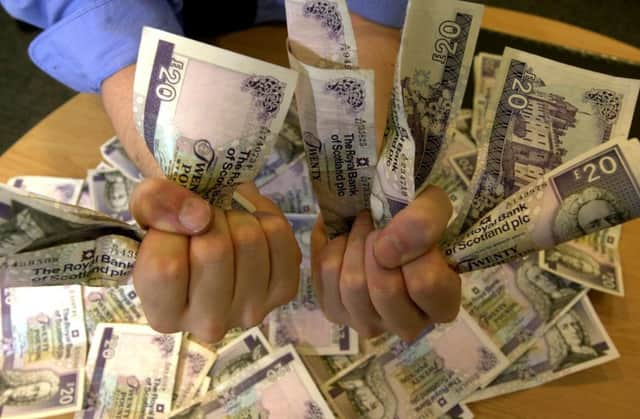Scottish independence poll: vote hinges on wealth


Some 52% of Scots would vote yes for an extra £1.37 a day but this drops to 15% if they stand to lose the same amount, ScotCen Social Research’s annual Scottish social attitudes survey suggests.
However, the £500 bonus is less persuasive than it was in 2011, when 65% told ScotCen it would tempt them to vote yes.
Advertisement
Hide AdAdvertisement
Hide AdSome 30% of all respondents said they will vote yes in the referendum and 54% said they will vote no.
The latest ScotCen survey, conducted between June and October last year, found 9% who think they would be personally better off with independence and 29% who think they would be worse off.
Most people (52%) do not think it will make any difference.
Voters are split on whether the economy as a whole would prosper, with 30% stating it would be better against 34% who think it would be worse.
More than a third (37%) say they do not know much or anything at all about independence, against 22% who say they know a great deal or quite a lot.
ScotCen research consultant John Curtice said: “The referendum campaign is at risk of short-changing the people of Scotland.
“So far it appears to have done little to help them be clear and confident about the decision they have to make.
“Many of the issues that preoccupy those campaigning for and against independence are apparently of peripheral interest to voters.
“Voters want to hear about the economic and financial consequences of the choice that they make, and it is on the outcome of that debate that the result of the referendum is likely to turn.”
Currency
Advertisement
Hide AdAdvertisement
Hide AdA third of yes voters doubt the Scottish Government’s assurance that it will keep the pound, rising slightly to 39% amongst no voters.
Support for keeping an independent Scotland in the European Union (EU) is slightly higher among no voters at 70%, although a similar number of yes voters (67%) back EU membership.
Overall support for independence stands at 29%, up six percentage points on 2012 but three points lower than 2011.
Support for the Scottish Parliament making all of the decisions for Scotland is 31%, down four points on last year.
Deputy First Minister Nicola Sturgeon said: “This survey, carried out before the White Paper was published, shows significant movement in favour of independence.
“It also confirms that when we win the economic argument, we will win the referendum. The facts say that Scotland will be better off with independence.
“The most recent official figures show that over the last five years Scotland’s finances have been healthier to the tune of £2,375 per person.
“By contrast, George Osborne is planning another £25 billion of cuts and there are Westminster politicians queuing up to take £4 billion a year from Scotland’s budget through the scrapping of the Barnett formula.”
Scottish Parliament
Advertisement
Hide AdAdvertisement
Hide AdLiberal Democrat leader Willie Rennie said: “The Liberal Democrat vision of building a stronger Scotland within the UK remains king.
“This poll shows substantial support for more powers to the Scottish Parliament whilst sharing across the United Kingdom.”
Blair Jenkins, chief executive of Yes Scotland, said: “The survey demonstrates that momentum is very much with Yes and we are confident that as more and more people become engaged, the large number of people who remain undecided will move to Yes.
“This research was, of course, carried out last year before publication of Scotland’s Future, the Scottish Government’s detailed guide to independence, and we know that the more people learn about the benefits of independence the more likely they are to vote Yes. The survey confirms that.
“We also know that the economic argument is key in this debate and if we win the economic argument we will achieve a Yes majority in September.
“But those who oppose independence also have a duty to spell out the costs and consequences of a No vote, something none of the political parties that comprise the No campaign have so far answered.
“Between now and September 18, we will continue to provide all the quality information people need to make an informed choice.”